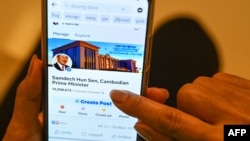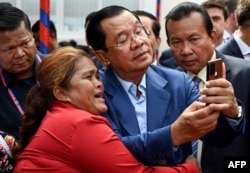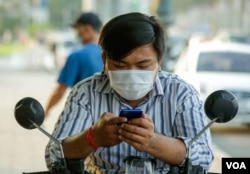WASHINGTON — In the summer of 2013, longtime opposition leader Sam Rainsy began boasting that he had surpassed Prime Minister Hun Sen in Facebook ‘likes,’ setting off a social media battle that would reshape political communications in Cambodia.
Initially, Hun Sen denied that the page was even his. “You won by running alone. I do not even have any Facebook,” the prime minister said at the time.
For the next two years, that remained the official line — until Hun Sen surpassed one million ‘likes’ in September 2015 and finally embraced the platform. By February 2016, his page had passed two million ‘likes’ and topped Sam Rainsy’s Facebook page in that measure of popularity, allegedly with the help of “click farms.”
Since then, the now 70-year-old leader has been an avid user of the platform, which has boomed along with the expansion of internet access across the country. His millions of followers have been given a carefully curated window into his official meetings, family birthdays, golf outings, trips abroad and exercise routines.
Then three weeks ago, Hun Sen’s Facebook page went dark.
After Meta’s independent Oversight Board publicly recommended to Facebook that the prime minister’s Facebook page be suspended for six months because of violent language in a video posted to his page, the premier apparently decided to de-activate his Facebook page.
Some have expressed concern whether he will allow Facebook to survive in Cambodia after being scorned by one of the world’s most recognizable and influential social media institutions.
Almost immediately after de-activating his Facebook account, Hun Sen warned that he could halt Facebook’s access to the Cambodian market, but then appeared to walk back his threat, saying he was not “stupid” enough to take away people’s livelihoods. But his critics aren’t so sure.
“I think we have to be ready for the possibility of Facebook being shut down [in Cambodia],” Alex Gonzalez Davidson, a pro-democracy activist kicked out Cambodia in 2015, told VOA Khmer, noting that Hun Sen recently has publicly said that Cambodian citizens should start moving to social media alternatives like Tik Tok and Telegram.
“I think if it's needed and possible, he’ll do it eventually,” he added.
However, Gonzales Davidson and other activists note that the timing for such a drastic move couldn’t be worse, with national elections set for July 23.
“Hun Sen may not want to use Facebook anymore, but the people of Cambodia still overwhelmingly do, and if he seeks to shut down Facebook, it will be hugely unpopular,” Phil Robertson, the deputy director of Human Rights Watch's Asia division, told VOA Khmer.
“The real question is whether his all-encompassing ego…has gotten so big that it overrules his basic political sense that it's not wise to anger huge swathes of the Cambodian people a couple of weeks before the July 2023 election,” Robertson said.
However, James Gomez, the regional director at the Asia Centre, a research institute based in Bangkok, said the political stakes were fairly low, given the lack of democratic competition in Cambodia in 2023. The Candlelight Party, a new iteration of the longtime opposition movement, has been barred from competing in the election due to missing paperwork.
“People will be annoyed should Facebook be shut down in the country due to the convenience of using this platform for communication with family and friends, posting photos, or making business,” James Gomez said.
“Still, people are not likely to be politically annoyed because of the lack of fair political competition in the country. I would not expect any outcry as the public is also likely to self-censor their opinions.”
And Gonzales Davidson — who now splits his time between Spain and Thailand — noted that, if Facebook was upended in Cambodia, the ruling Cambodian People’s Party would lose an invaluable political tool of its own as it prepares for a generational transition. Facebook has been a crucial platform for the rising status of Hun Sen’s eldest son and heir apparent, Gen. Hun Manet, who has often posted his own speeches and public appearances on the platform in recent years.
“You have to realize that Hun Manet and the new generation of CPP use Facebook massively,” said Gonzales Davidson. “If you want to rule by propaganda, deceit [and] threats, then you need Facebook. You can't switch over to Telegram so fast.”
Facebook has also been closely monitored in Cambodia by authorities for dissent in recent years, with Hun Sen regularly calling out his Facebook critics, who in some cases are quickly arrested and charged with crimes like incitement over posts mocking or attacking the government.
The fear of Facebook being shut down in Cambodia is not entirely new. The government has repeatedly restricted access to websites critical of the ruling party, and has reportedly worked with Chinese advisors on increased surveillance, both online and offline.
Should the CPP once again face a serious threat to its power, as it did a decade ago, activists worry Cambodia may be prepared to impose more Beijing-like control over the internet.
In recent weeks, the government has banned Facebook representatives from the country and canceled any partnerships with its parent company. Meta has not announced an official suspension of the prime minister.
In its recommendation, the oversight board cited the “severity of the violation, Hun Sen’s history of committing human rights violations and intimidating political opponents, as well as his strategic use of social media to amplify such threats.”
In the video, he calls on political opponents to choose between the “legal system” and “a bat,” and says should they choose the latter, he “will gather CPP people to protest and beat you up.”
Yet ruling party spokesman Sok Eysan wholly dismissed the idea that Hun Sen was issuing threats via social media, arguing it was the prime minister’s “right” to use the platform.
“Thus, I think the allegation that the prime minister is using violence and hate speech and so on is just an untrue accusation,” Sok Eysan told VOA Khmer.
Elina Noor, senior fellow in the Asia program at Carnegie Endowment for International Peace, said the public recommendation by the Meta Oversight Board sent a strong signal that “the threat of violent harm by a political leader in an already fraught electoral context should not be tolerated or rewarded.”
She said that risk of harm is amplified in a country like Cambodia, where much of the population has experienced over years “a sustained campaign of harassment and intimidation towards the political opposition.”
While the board’s move could impact Facebook in Cambodia, and send a message to other world leaders, Noor said it was unlikely to change the underlying political dynamics.
“Facebook will likely have a challenging operating environment in Cambodia as a result of the Board’s decision,” Noor said.
“In terms of impact, the suspension of Hun Sen’s Facebook and Instagram accounts – while an important signal – does not necessarily reduce the existing and continued offline risks faced by his political opponents,” she said. “He continues to engage through social media on other platforms and remains the dominant voice in traditional, mainstream media.”
Gonzalez Davidson noted that Hun Sen’s speeches and public comments will also continue to be broadcast on government-aligned Facebook pages like Fresh News Asia, which has 4.4 million followers in a country of some 16 million people.
“They disguise themselves as media but they're just a de facto spokesman of the prime minister,’’ Gonzalez Davidson said. ‘’So if you no longer have Hun Sen but you continue to have Fresh News Asia, and all these fake media outlets out there, what's the difference?”
Lim Cheavutha, the founder and CEO of Fresh News, contested the activist’s description of his outlet, arguing it has operated “professionally” for nine years.
“His allegation on my media outlet is completely wrong,” Lim Cheavutha said.






